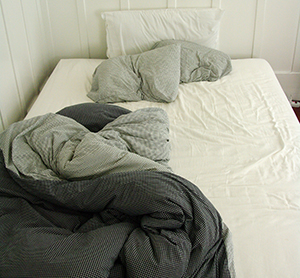 Logging eight hours of sleep per night can take as much as three years off your real age. Sleep deprivation, on the other hand, lowers circulation, causing you to look pale and washed out. Here’s how to get the sleep you need to wake up glowing. From The Mind-Beauty Connection by Dr. Amy Wechsler
Logging eight hours of sleep per night can take as much as three years off your real age. Sleep deprivation, on the other hand, lowers circulation, causing you to look pale and washed out. Here’s how to get the sleep you need to wake up glowing. From The Mind-Beauty Connection by Dr. Amy Wechsler
Don’t take your to-do list to bed.
Write down the next day’s list early in the evening and stick it in your bag or on the fridge. Then you won’t start anxiously making mental notes the minute your head hits the pillow.
Take something.
Sometimes, to kick insomnia and get back on a better sleep cycle, all you need is to break the pattern. My cheap, super-simple, method: Take an antihistamine 30 minutes before bed (regular Benadryl — not a non-drowsy formula! — works fine) for one to three nights. Antihistamines make many people sleepy. No prescription needed.
Alternatively, try valerian herbal tea or the combo of chamomile and valerian in Celestial Seasonings Sleepytime Extra Wellness Tea. It definitely helps some people. Others swear that melatonin, the sleep-regulating hormone you can find now in a supplement form over the counter, helps them, but I’m not a fan. The amount in different products can vary wildly, despite what the labels say. It may not work for you, and its long-term safety has yet to be determined. (It’s also highly unlikely that you have a melatonin deficiency; you simply need to establish better sleep habits.) I’d rather see you sleep according to your own body’s clock and rely on your own production of natural melatonin. If your body clock is off, try getting some natural morning sunlight on you, do some exercise during the day, don’t stay up until the wee hours of the morning cleaning house, and set aside time to wind down before bedtime.
Try a bedtime snack.
The best bedtime snack is one that has both complex carbohydrates and a little protein, plus some calcium. Calcium helps the brain use the amino acid tryptophan to manufacture melatonin. This explains why dairy products, which contain both tryptophan and calcium, are one of the top sleep-inducing foods. And by combining carbohydrate together with a small amount of protein, your brain produces serotonin, the pleasure hormone with strong ties to mood.
Get out of the bedroom.
We all think that if we lie in bed long enough, sleep will come. Instead, our minds tend to get busier and our muscles tenser as we stress over being awake. Give it a rest. If you can’t get to sleep within twenty minutes, slip out of bed and go to a safe haven — a place that’s comfy, has dim lighting, and no distractions. Just sit comfortably. Or do your breathing exercises. Or read. No e-mail, television, or other electronics, though. The point is to give your mind-body a respite from trying so hard to nod off. After twenty minutes or so, go back to bed and see what happens when you’re more relaxed. Repeat once or twice if necessary.
Make like a corpse.
Assuming the yoga corpse pose (savasana) is, well, a little like playing dead. Basically, you lie on your back on a cushioned surface, legs slightly rotated out, arms at your sides but not touching your body, palms up. Then slowly s-i-n-k into the pose, breathing naturally and letting your whole body go limp. Stay in this position for a few minutes, or for as long as you like.
R-e-l-a-x.
Progressive relaxation, an effective technique that’s been used since the 1930s, couldn’t be simpler. It’s also worked for me ever since I was a homesick kid at sleep-away camp for the first time and couldn’t sleep at all. A counselor taught it to me and I still use it when I need to. What to do: Stretch out in bed and, one by one, squeeze and release all the muscles in your body, starting with your scalp and working down to your toes. Ironically, tightly tensing up your muscles before relaxing them helps them relax more than just plain relaxing them.
Let scent send you to sleep.
Aromas widely considered to be relaxing are rose, lavender, vanilla, and lemongrass, but different ones work for different people (some people find lavender stimulating). If one calms you, keep a sachet near your pillow at night to whiff at will, or use a scented hand lotion.
Have any other tips that help you go to sleep better at night? Comment below and let other readers know!



Share Your Comments & Feedback: